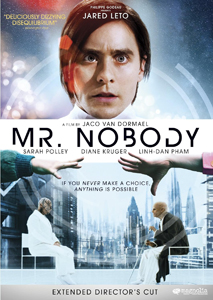“Mr. Nobody” (2009) is a lavish, wonderfully acted and deeply thoughtful sci-fi movie that, ironically, nobody talks about. But maybe it’s due for a reappraisal amid this boom of movies about multiverses. Its emotional center is Jared Leto’s performance as Nemo Nobody at his normal age of 34 and as a 117-year-old man in aging makeup that’s as good as anything today.
Three younger actors also portray Nemo in this English-language French production. Writer-director Jaco Van Dormael tugs at the heartstrings by portraying Nemo’s small but pivotal life moments and subtly prodding us that it’s all leading toward something profound.
Scientist Nemo narrates about the butterfly effect and gives speeches on 10-dimensional string theory (of which humans can experience three spatial dimensions plus time). Composer Pierre van Dormael – the director’s brother who died of cancer during production – crafts an ever-present and ever-pleasant score that reminds us of the import of it all.

“Mr. Nobody” (2009)
Director: Jaco Van Dormael
Writer: Jaco Van Dormael
Stars: Jared Leto, Sarah Polley, Diane Kruger
A journey through time
The cityscape and societal details of 2092, plus Nemo’s journey to Mars at some point before that, further expand the world. We see bizarre normalizations of things like genetic engineering and cloning, and a Philip K. Dickian gag about how bicycles are made on Mars and shipped back to Earth because it’s cheaper than Chinese labor.
But “Mr. Nobody” is also about contraction. Fellow scientist Anna (Diane Kruger) calculates that the Big Crunch will hit Earth in 2092. PKD fans lamenting that “Counter-Clock World” will likely never be adapted can get a flavor of the Hobart Effect, where chronological processes go in reverse.
The film is also about choices, memory, forgetfulness and that simplest yet most complex of concepts: love. The story pivots on the notion that young Nemo (Noa De Costanzo at 5, Thomas Byrne at 9 and Tony Regbo at 15) has to choose between hopping a train with his mother (Natasha Little) or staying at the station with his father (Rhys Ifans) when they divorce. That’s a horrible question to pose to a kid, but it’s also a strong pivot point for a story about choices and possible outcomes.
Nemo and Anna are scientists and “Mr. Nobody” is filled with familiar but personalized SF spectacle such as Nemo’s waking up, frost-covered, in the Mars-journey cryopod. But this is actually a love story, as we see three possible matches for Nemo: Anna (Laura Brumagne as a kid and Juno Temple as a teenager, before Kruger takes over), Elsie (Clare Stone and Sarah Polley) and Jean (Audrey Giacomini and Linh-Dan Pham).
One is his heart’s choice, one is his brain’s choice, and one is the perfect combination of the two – something that only a lucky few are able to land. Some viewers might find this thread fantastical, but that’s OK given “Mr. Nobody’s” heady SF presentation. While writer-director Van Dormael shows romantic-dreamer tendencies, his most well-known and well-regarded film ultimately is quite grounded.

A journey through lifetimes
Polley gives a powerful portrayal of Elsie’s depression, and Leto supports it as a husband who doesn’t know what to do, although he desperately wants to help. Temple and Regbo elevate what could’ve been a soapy story of teens whose relationship becomes taboo when their single parents begin dating. They have such good chemistry that even Leto and Kruger can merely carry the baton. Joan is the practical, carefully selected mate, and there’s a certain low-grade tragedy in that.
While I seem to be describing a downer, “Mr. Nobody” balances Nemo’s paralyzing choices and challenging situations within those possible timelines with a brainy liveliness. The writer-director crafts a propulsive, 2-hour-plus film despite the morose and brooding themes. For example, the 2092 scenes feature news clips of a 2092 tabloid journalist breathlessly covering humanity’s Last Mortal Man; it’s like something from a Paul Verhoeven film, minus the cynicism.
A mystery percolates behind it all, even though it’s hard to say precisely what we’re supposed to zero in on. We’re not told if these are Nemo’s possible realities, or if we’re seeing a batch of multiple realities presented for the sake of comparison and contrast. We don’t know if young Nemo is “remembering” the future (he has this rare ability) or if ancient Nemo is remembering the past (although he can’t remember anything, he tells his interviewer).
Even at the end, we’re still invited to make our own interpretation (like that final scene from “Buffy’s” “Normal Again” that could point either way, except with more than two directions). But I think the answer is in there somewhere. The film is good enough that I wouldn’t mind watching it again someday to see if Van Dormael clearly answers it for an eagle-eyed viewer.
The themes and discussion points about time, choice, reality and love will hold up on repeat viewings, and on repeat trains of thought about Van Dormael’s modest masterpiece. “Mr. Nobody” follows in the tradition of “2001” to stand as one of the great emotional/thoughtful SF films since our timeline hit the real 2001.

